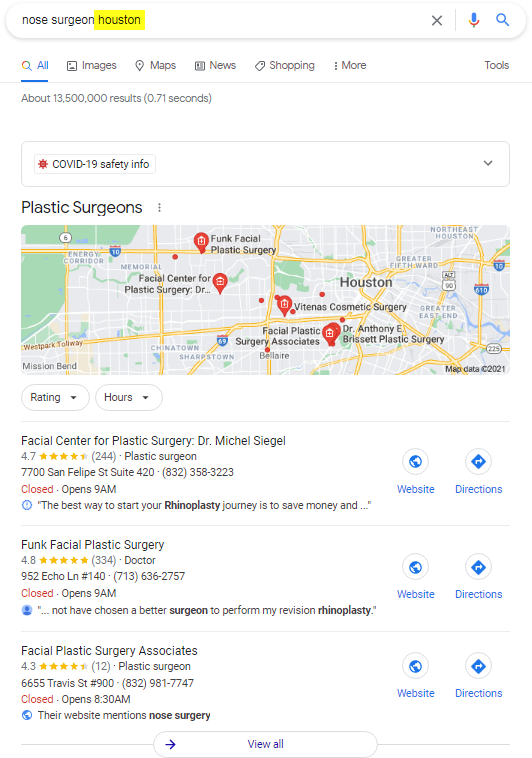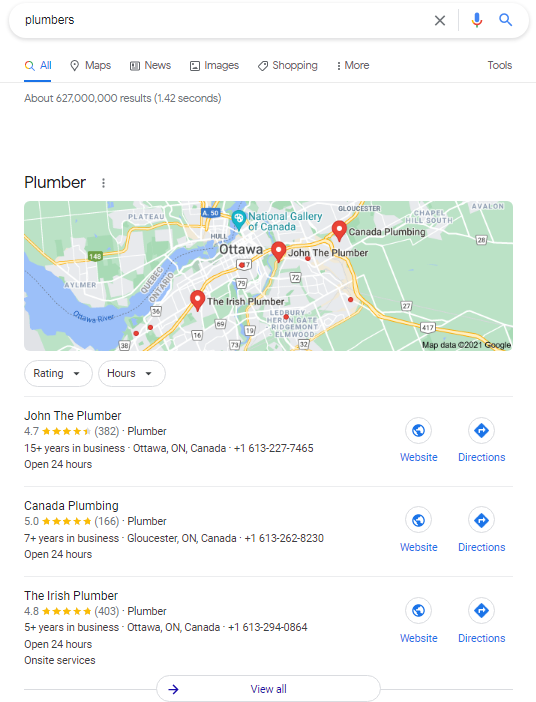Business owners, SEOs, and others refer to good local search rankings as high and bad rankings as low, but they don’t look at whether their rankings are thick or thin. If you just turn your head to the side 90 degrees, you’ll see weaknesses and opportunities you probably missed before. You’ll see ways to thicken up your local visibility, and that will be glorious for business.
What’s a “thin” ranking? The short answer is it’s the same problem as when a baseball team doesn’t have a “deep bench,” and loses a game every time something goes even a little wrong. You want visibility / rankings that can withstand a lot going wrong, because if you’re in business for long enough and if you depend on Google visibility enough, that’s exactly what will happen.
The longer answer is your business probably has thin rankings any time one or more of these describes your situation:
1. Only one page on your site ranks for anything, and the rest of your pages limp along. In this case, the least-bad situation is if your homepage hauls in most of your rankings – as it often the case – because it’s most likely to rank for a range of terms. But if a subpage brings you most of your rankings and/or traffic? That’s thinner ice.
2. Only one location ranks well, if your business is multi-location. There’s no reason to expect them all to perform the same, and some cities or towns or neighborhoods are easier than others. But if there aren’t big differences in your local SEO strategy from one location to the next, then the one location that’s chugging along may be this close to squeaking along the way your other locations do.
3. You’re eligible for “practitioner” pages or “department” pages, but your Google My Business page for one of them or for the main office is the only one that ranks on the map. Let’s say you’ve got a single-location dental practice with 3 dentists. Each dentist is eligible for his or her own GMB page, and the practice can have one. Would you believe that’s a total of 4 – 4! – GMB pages that might rank for this or that?
4. You rank only in Google Maps / the local pack, and not in the organic results. In my experience, the Maps / 3-pack rankings are more volatile than the organic results are. Keep in mind that many organic results are location-specific, and have been for many years. (So I’m not saying you need to rank in the organic results across the country or in other countries.)
5. You rank only in the (localized) organic results, and not in Google Maps / the local pack. Of course, the map is pretty visible, and you want to be there, preferably with some organic rankings, too. By the way, as you may noticed, your organic SEO (i.e. on-page content / optimization and links) is a huge factor in how you do on the map.
6. You rank only for terms that are identical, similar to, or part of your business name. Unless you perform only one service or sell only one widget, then you are the panda bear of the local search results – always one bad meal or extra-slow mating season away from extinction. Especially if that “business name” is not your real business name at all, but rather a keyword-rich one that’s designed just to help your Google My Business page rank, then you’re vulnerable to a competitor’s editing out the keyword or term. You’ll probably continue to rank for that term, even if it’s no longer part of your name, but in time you’ll probably drop.
7. You rank only for geographically explicit search terms, where the city name or other place name is in the query. Most searchers won’t actually specify where they want to see results, because they know that Google knows where they’re located and will show nearby results by default. Use Google’s Anonymous Ad Preview Tool to see how you hold up in various places for the same search term

8. You rank only for geographically broad search terms, which consist of a service or product (and maybe other modifiers, like “near me”) and no place name. If these are your only rankings, your rankings are too location-sensitive, in that Google’s showing you in the search results mainly because the searcher is close to you and vice versa. In that case, you need to grow the tentacles a little.

9. You rank only for local one-box terms. In this case, either you’re gunning for terms that have very few competitors (smart), or Google has assumed that people who type in those terms are searching for a specific company when in fact they’re searching only for a specific thing and don’t care who offers it.
10. You rank only in a small geographical area or in one city. This problem requires none of my color commentary.
11. A page – or a blog post – on your site that ranks well only ranks well for one solid search term or for a closely related family of search terms. In other words, your best-performing pages are one-hit wonders or maybe two-hit wonders.
12. Your only rankings of any kind are in Google. Good thing not too many people begin their searches in Apple Maps, Yelp, Bing, and the thousand various directory sites, because you’re not even a chalk outline there.
You get the idea. On one level, the problem is obvious: too many of your eggs are in too few baskets. But the real problem is that having “thin” rankings means it’s very easy for you to drop off, or to get knocked off. If you have some good rankings but you don’t have many rankings, you’re probably one algorithm update or one tough competitor or one determined spammer from uniformly bad rankings. One way to read my quick-n’-dirty list is as an actuarial table that tells you the likelihood of a disastrous drop-off in Google.
There’s a psychological component to the problem, too. If you rank well only for a few terms, especially if they’re high-priority search terms, you probably won’t want to change much or anything, because you probably don’t want to touch anything that messes up the gentle balance. More likely than not, you just don’t want to bungle things.
It’s great if you have solid rankings for the terms you care most about. That’s the 80/20 rule, and I’m a big fan of it. But the point is you can probably bump yourself up for even more high-payoff local search terms, and you can hedge with some that are less competitive but still profitable.
How do I suggest you thicken up your thin rankings? By working on these items, for starters:
- Crank out service pages. Both for major services/products and for for more-niche offerings. These will help you expand not only your organic rankings, but also the range of terms you rank for on the map.
- Make spin-off pages whenever you can. Be sure to add plenty of internal links to those pages. Along the way, you may get yourself a few one-box results.
- Work your homepage more – way more. Don’t just focus on one service, product, or city.
- Consider changing your GMB landing page URL(s). If you’ve got a multi-location business and some locations are getting beat up on the Google map, point their landing page URLs to the homepage rather than to a “location” page.
- Use”practitioner” or “department” Google My Business pages (if applicable) to the fullest. Pick a different GMB category for each (if possible), optimize each person’s or department’s page on your website for different specialties / search terms, and use that page as your landing page URL on the corresponding GMB page. In other words, “divide and conquer.”
- Use Google Search Console to study which pages rank and for what specific terms. In particular, look for pages that get lots of impressions or clicks for terms you care about, and add content to those pages that’s relevant to other terms – possibly similar terms – that you also care about. Clearly, Google already digs the page in some ways, and possibly will dig it even more after you put in some additional work.
- Encourage reviewers to go into detail in their reviews, particularly in Google Maps reviews. The hope is that they mention specific services or products, or certain qualities of them.
—
How “thick” are your rankings?
What have you done that’s helped, and what have you tried that hasn’t worked?
Any first-hand experience with being too reliant on a few terms, and then dropping off for those terms?
Leave a comment!


Recent Comments